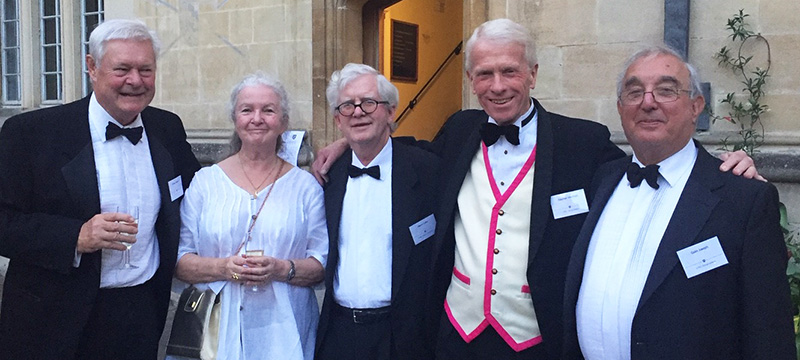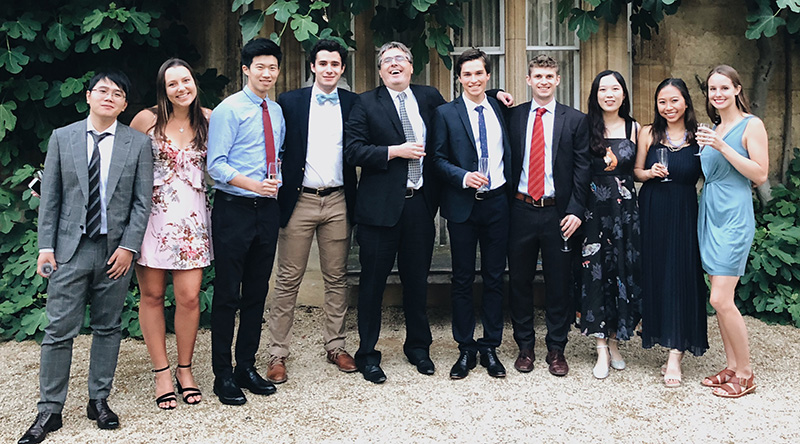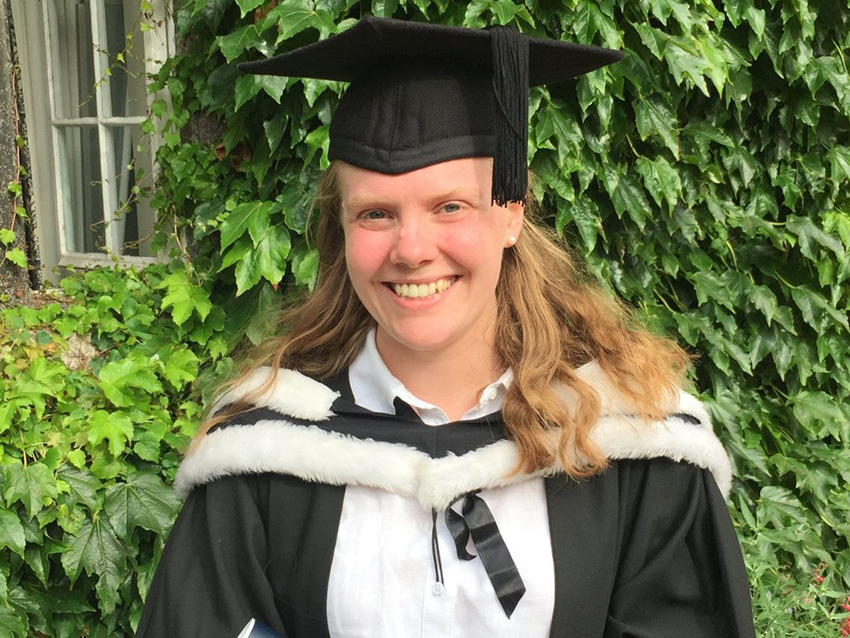Rector Trainor reviews the events of the Long Vacation
College life takes on a different character over the Long Vacation, though it is no less busy! We began the summer by congratulating our leavers on their achievements, which included a creditable 31 Firsts among our undergraduate finalists, 26 Firsts or Distinctions among our undergraduate students sitting their first public examinations and 19 postgraduate distinctions as well as many successfully completed doctoral theses. The College wished its new graduates farewell at a popular Leavers’ Lunch in June for students and their families and at a series of graduation ceremonies and receptions in July. There then followed a buzz of organisational activity, much of which would not be possible during term time but is essential to the success and smooth running of the College.
We welcomed a number of summer schools to Exeter’s historic Turl Street site and to our much newer but equally splendid site in Jericho, Cohen Quad. The summer schools provide important income to the College while attracting talented, enthusiastic and inquisitive minds. None more so than the Exeter College Summer Programme, which is the only summer school programme created and delivered by Exeter College (as distinct from simply being hosted here). Now in its third year, the Summer Programme already enjoys an impressive reputation for its academic rigour and the outstanding opportunities it provides students, who come from some of the most respected universities in the world and some of whom have gone on to study full-time at Oxford or Cambridge. It will be interesting to observe how this growing international network of Summer Programme alumni gradually makes its mark on the world. In September the College held its first ‘bridging’ programme, a forerunner of Exeter’s major access initiative, ‘Exeter Plus’. Led by Tutor for Admissions Professor Conall MacNiocaill (Earth Sciences), the week provided training in essay writing and numerical analysis, as well as a general introduction to study at Oxford, to volunteers drawn from students about to enter as undergraduates in October. The apparent success of the pilot augurs well for the first formal running of the bridging programme in September 2020.
Exeter College Summer Programme students enjoy an evening in the Fellows’ Garden
Perhaps a little less welcome, but important nevertheless, were the glaziers who repaired or replaced more than 230 windows across the Turl Street site over the summer, including those of the Rector’s Lodgings. This substantial project will ensure that the buildings are well protected for years to come from rain (of which we have witnessed rather a lot in the short time since the work was completed!). It will also improve the buildings’ environmental credentials, substantially reducing drafts and heating costs while making them more comfortable places in which to study and live. The College has taken a number of other measures over the summer to reduce its impact on the environment, including: ceasing to provide plastic water bottles at conference events and replacing them with water fountains; offering students and staff reusable drinks containers (‘keep cups’) at a heavily subsidised price in place of disposable cups, which we have discontinued; distributing Exon, the College magazine, in fully biodegradable and compostable wrappers made from starch; and piloting a system of Wi-Fi controlled radiator valves that will optimise central heating usage. The College’s commitment to reducing its impact on the environment will be further underlined in the new College strategy, which we will publish shortly.
There have been numerous notable recent achievements of Exeter’s Fellows. Ervin Fodor, Professor of Virology at Oxford’s Dunn School of Pathology, recently published in the journal Nature research that could lead to the development of new flu treatments. Professor Fodor, in collaboration with Professor Jonathan Grimes at the University’s Division of Structural Biology, has ascertained the molecular structure of a protein that is vital for the survival of the flu virus, thereby presenting a brand-new way of potentially inhibiting it. Professor Jonathan Herring, DM Wolfe-Clarendon Fellow in Law, has won the 2019 BMA Medical Book Award in the ‘Basis of Medicine’ category. He received the award for his book, Medical Law and Ethics. Dapo Akande, Professor of Public International Law, has been appointed international law adviser to a public inquiry established by the New Zealand Government. The inquiry is examining the conduct of New Zealand Defence Forces during the conflict in Afghanistan. Dame Carol Robinson (Dr Lee’s Professor of Chemistry) won the Royal Society’s Royal Medal ‘for her pioneering work on structural biology improving the understanding of proteins, their interactions and functional regulation’. Luciano Floridi, Professor of Philosophy and Ethics of Information, was presented with the 2019 award for Responsible Communication at the 15th annual #premioAreté awards ceremony in Milan. Finally, I note the signal accomplishments of Tutorial Fellows Michael Osborne (Engineering) and Karin Sigloch (Earth Sciences, also Sub-Rector) in gaining the University’s ‘recognition of distinction’, a conferment of title equivalent to a full professorship. I was also very pleased to receive the news of the publication, by former Fellow Christopher Markiewicz (History), of The Crisis of Kingship in Late Medieval Islam: Persian Emigres and the Making of Ottoman Sovereignty.
Dapo Akande, Professor of Public International Law
In much sadder news, former Fellow in Law Professor Stephen Cretney died in August at the age of 83. Dr Cretney was a Fellow at Exeter from 1969 to 1978. He went on to become a Law Commissioner, then Dean of the Law Faculty at Bristol University and later a Senior Research Fellow at All Souls. Dr Cretney was a key authority in family law – still an area of great strength at Exeter through the work of Professor Jonathan Herring and Professor Rachel Taylor – and had well-developed research interests also in the legal system and in modern legal history. He is survived by his wife, the Reverend Antonia Cretney, formerly College Secretary at Exeter, and by their sons Matthew and Edward.
I also note the memorial service, held in the College Chapel on 21 September, of Emeritus Fellow Walter Eltis. A much loved Fellow and Tutor in Economics from 1963 to 1988, Dr Eltis went on to play influential roles in the formation of national economic policy, notably as Chief Economic Advisor to the President of the Board of Trade. At the well attended service, which was taken by Exeter’s chaplain Andrew Allen, I gave a welcome, and tributes were paid by Walter’s daughter Sos (Fellow in English at Brasenose), my predecessor Rector Cairncross (who cited praise for Walter contributed by several of his former students at Exeter) and Walter’s economics colleague Peter Sinclair (formerly Fellow of Brasenose).
On the same day, a much less solemn occasion was the Gaudy for Exonians who matriculated before 1970. The assembled alumni and Fellows listened intently to a speech, both humorous and substantial, from Colin Joseph (1965, Jurisprudence). The pre-1970 group proved so eager to return that we could very easily have filled the Hall twice over, so we shall hold another Gaudy on 21 March 2020 for anyone who came up to College in 1969 or before. Those who were unable to attend the recent Gaudy will be given ‘first refusal’. In response to alumni feedback, the March Gaudy will, initially at least, be open only to alumni, with their guests permitted nearer the time only if there is capacity.

The Gaudy for alumni who matriculated before 1970 was extremely popular
Regarding alumni, among recent deaths of Exonians, I note that of Rachel Griffin (1995, Modern Languages), chief executive of the Suzy Lamplugh Trust, whose intrepid campaign against stalking resulted in an Act of Parliament. In terms of numerous recent alumni achievements, I would highlight the appointment as High Commissioner to Zimbabwe of Melanie Robinson (née Speight) (1995, Modern History).
It was with great pleasure that, in September and October, we welcomed seven new Fellows to Exeter. They are Dr Francis Bischoff, Junior Research Fellow in Mathematics; Dr Stephanie Cavanaugh, Sir John Elliott Junior Research Fellow in Spanish History; Professor Nandini Das, Tutorial Fellow in English; Charlotte Elves, Singer Fellow in Medical Law and Ethics; Dr Rajssa Mechelli, Career Development Fellow in Economics; Peter Warner, Finance and Estates Bursar; and Yvonne Rainey, Director of Development and Alumni Relations. We are also welcoming four new Visiting Fellows: Professor Jongsook Lee from Seoul National University’s Department of English Language and Literature; Hanna Meretoja, Professor of Comparative Literature at Finland’s University of Turku; Claudia Olk, Professor of English and Comparative Literature at the University of Munich; and Professor Nicolas Espejo Yaksic from the Catholic University of Chile’s Centre for Studies of Justice and Society.
Dr Rajssa Mechelli is one of seven new Fellows to join Exeter College
As we enter a new academic year – which for me marks the end of my two-year term as Chair of Oxford’s Conference of Colleges – it is important to note that this Michaelmas Term marks the 40th anniversary of co-education and female Fellows at Exeter. This significant milestone has already been the subject of celebration in Exon, which you should recently have received (please contact the Development and Alumni Relations Office if you did not). It features articles predominantly written by or about some of the remarkable women who have studied and worked at Exeter College since the first cohort of female students arrived in 1979. There will be further celebrations throughout the year, including a joint event with Exeter’s sister college, Emmanuel College, Cambridge, which will take place in London next summer. On 9 November the College is holding at Cohen Quad a special symposium on women at Exeter, which will include contributions from female students, alumnae and Fellows as well as Rector Cairncross.
As I reflect on the achievements and contributions of women at Exeter over the past 40 years (including the manifold accomplishments of Rectors Cairncross and Butler), it is appropriate to highlight a few of the latest accomplishments among our female students and recent alumnae. Nora Cyrus, who came up to Exeter in 2017 for an MPhil in Development Studies, has won the 2019 Papiya Ghosh Prize for her thesis; Eleanor Sharpe (2013, Cell and Systems Biology) has been awarded the Physiological Society Prize for best overall student in Physiology at the University of Oxford; and DPhil candidate Halina Suwalowska (2016, Population Health) has created an art exhibition in collaboration with Anna Suwalowska of the Royal College of Art, which will be on display at Oxford’s Jam Factory until 24 November. Meanwhile in sport, two Exeter students, Joss Barker (2017, Earth Sciences) and Jessica Abele (2019, Physiology, Anatomy and Genetics), have been named to the University’s provisional squad for the women’s Varsity match in December. I look forward to witnessing further achievements at Exeter and beyond, by Exonians of all genders, during the new academic year.
Professor Sir Rick Trainor
Eleanor Sharpe (2013, Cell and Systems Biology), photo by Guy Hurrell




